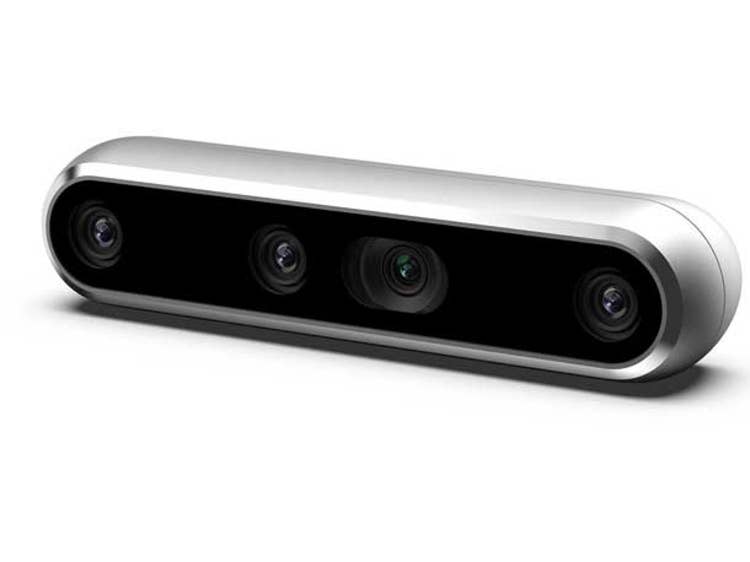Intel Says It’s ‘Winding Down’ RealSense Camera Business
The semiconductor giant tells CRN that it is ‘winding down’ the company’s portfolio of high-tech cameras and sensors that were built for computer vision applications like robotics and digital signage to focus on its core businesses. The company will honor current customer commitments, and Intel plans to apply the technical expertise and talent it developed in computer vision to support other functions in the chipmaker’s core businesses.

Intel said it’s “winding down” its RealSense computer vision division to focus on its core businesses, marking the beginning of the end for a portfolio of high-tech cameras and sensors that were built for robotics, digital signage, 3D scanning and other forward-looking use cases.
An Intel spokesperson told CRN on Tuesday that the Santa Clara, Calif.-based company will honor current customer commitments, and it will apply the technical expertise and talent in computer vision it developed to support other functions in the chipmaker’s core businesses.
[Related: Intel Reorganization: 8 Big Changes Made Under Pat Gelsinger]
“We are winding down our RealSense business and transitioning our computer vision talent, technology and products to focus on advancing innovative technologies that better support our core businesses and IDM 2.0 strategy,” the spokesperson said in an emailed statement.
“We will continue to meet our commitments to our current customers and are working with our employees and customers to ensure a smooth transition,” the spokesperson added.
In a new statement sent Friday, an Intel spokesperson said the winding down of the RealSense business has resulted in the end-of-life for the division's LiDAR, facial authentication and tracking product lines.
However, the spokesperson said, Intel will continue to sell select stereo products through its current distribution customers. The supported products consist of the D410, D415, D430 and D450 modules as well as the D415, D435 and D435i integrated product lines.
The winding down of Intel’s RealSense business was confirmed two weeks after Sagi Ben Moshe, the head of RealSense and general manager of Intel’s Emerging Growth and Incubation group, said on LinkedIn that he was leaving the company after 10 years of service to start the next chapter of his career.
Pitched as a “fast and easy” way to build products with computer vision capabilities, the RealSense portfolio consisted of stereoscopic, LiDAR and coded light cameras and modules that supported high resolutions and high frame rates in various form factors. These products were powered by Intel’s RealSense Vision processors and ASICs, and they were complemented with software development kits and software for use cases like skeleton tracking.
Most recently, Intel expanded its RealSense portfolio in January with Intel RealSense ID, an on-device facial authentication solution that was targeted for smart locks, access control, point-of-sale systems and other kinds of devices.
According to Intel’s RealSense website, customers ranged from RightHand Robotics, which uses RealSense for piece-picking robots in warehouses, to Prowise, which uses the technology for a gesture-based learning tool. Intel’s drones also use the technology.
Kent Tibbils, vice president of marketing at ASI, a Fremont, Calif.-based distributor, told CRN that his company distributes RealSense products and while he wasn’t aware of Intel’s plan to shut down the business, he wasn’t surprised to hear the news, at least when it came to the roughly 10 customers who bought RealSense products in relatively low volumes.
“There were only a few that were buying multiple units, like 10 to 40 at a time,” he said. “It was definitely very nichey and very specialized for the general channel. It wasn’t a huge product.”
Tibbils said the products, which ASI’s customers used for medical applications and digital signage, was likely a better seller for distributors with a greater focus on industrial and embedded applications.
However, Tibbils said, Intel’s decision to end the RealSense business makes sense given that the company’s CEO, Pat Gelsinger, is looking to double down on the chipmaker’s PC and server businesses in his bid to return the company to a leadership position.
“I do like to see Intel focusing their resources more in their core business. I think that makes a lot of sense, and that is more of a positive for the channel overall,” he said. “There are so many opportunities growing around [Intel’s core business], especially on the server side, that I think that’s the bigger benefit for everyone.”